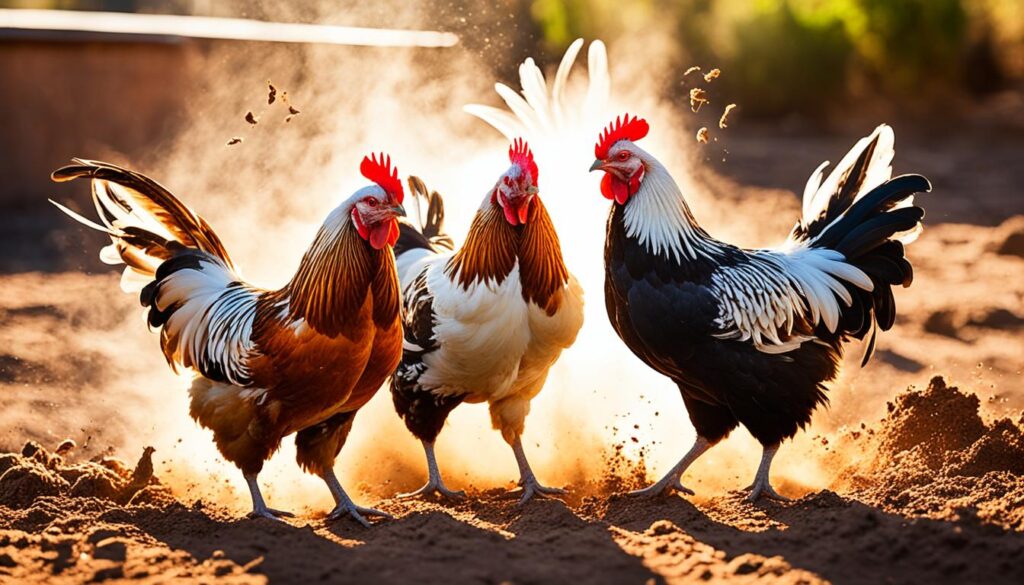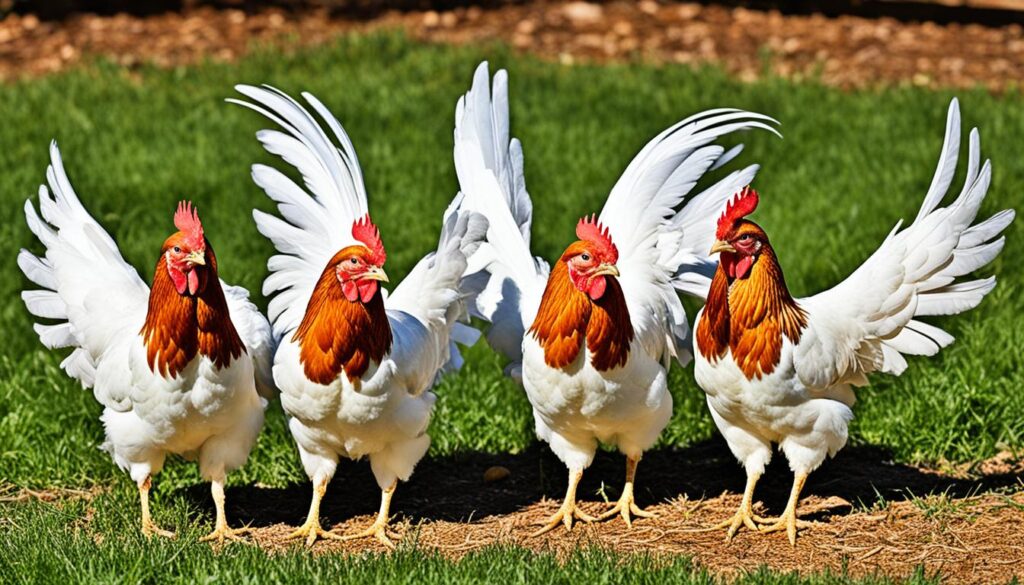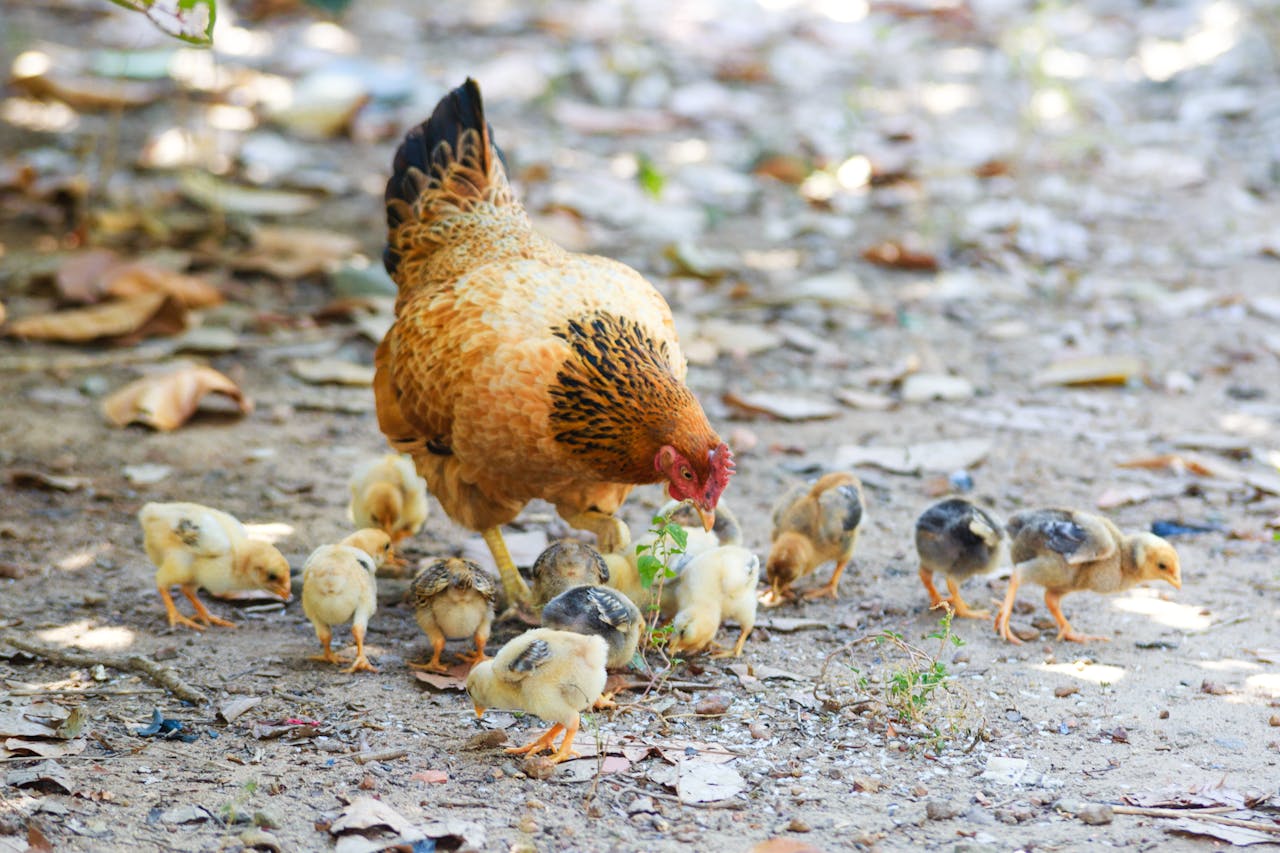Chickens are interesting animals with unique behaviors. As a journalist, I aim to share insights on their instincts and actions. This knowledge helps us make their lives better.
At JMZ Farms, we understand how crucial it is to respect chickens’ natural instincts. Our pasture-raised environment gives hens the freedom to roam, search for food, and act naturally.
Key Takeaways:
- Chickens have unique behavioral traits and instincts that can be understood and nurtured.
- Creating an environment that aligns with their natural behaviors promotes their overall well-being.
- Foraging, social dynamics, dust bathing, and nesting are important behaviors to consider.
- JMZ Farms prioritizes pasture-raised environments to allow hens ample space to explore and forage.
- Understanding chicken behavior contributes to responsible and ethical farming practices.
The Basics of Chicken Behavior
Chickens are interesting animals to raise or work with. They have specific behaviors that shape their lives and how they interact. These instincts are key to their daily routines within a flock.
Chickens love to look for food on the ground. They search for insects and seeds which is a big part of their day. Watching chickens in this way shows how clever and adaptable they are.
Chickens enjoy being in a group and feel safe in their flock. They set up a pecking order to keep peace and order. The pecking order also decides who gets to food and water first.
Dust bathing is important for chickens. It helps them stay clean and get rid of pests. They scratch the ground, make a hole, and then roll in it. This keeps their feathers in good shape.
Hens have a strong desire to nest. Suitable nesting spots are important for them to lay eggs. A cozy, hidden spot makes them feel safe. This helps the flock’s health and ensures the eggs are healthy too.
Knowing how chickens behave helps us take good care of them. We learn about their foraging, how they get along, how they bathe in dust, and their need to nest. This knowledge helps us make their lives better and happier.
“Watching chickens in their natural setting teaches us a lot. It’s key to giving them a happy life.”
Chicken Cognition and Intelligence
Scientists have found out some amazing things about chickens. They’ve discovered that chickens are not as simple-minded as we once thought. They have complex thoughts, deep feelings, and strong social skills. Chicken cognition includes knowing themselves, learning from others, and controlling their actions.
Chickens know who they are, which is pretty impressive. This means they can look in a mirror and know it’s them. They also feel hopeful or nervous about what might happen next. This shows they can think ahead and have expectations.
Chickens learn by watching their friends. They change how they act by what they see around them. This helps them get better at dealing with their world.
They can also wait for something better instead of just going for what’s right in front of them. This shows they’re smart, just like some of the smartest animals we know.
“Chickens are not as dumb as previously believed. They exhibit remarkable cognitive abilities that challenge our long-held assumptions about their intelligence.”
Chickens have minds like other birds and mammals. This shows they are aware and smart, able to do many things we do. As we learn more, we see how amazing chickens truly are.
Common Chicken Behaviors
Chickens show many behaviors that are key for their health. Knowing these can help us make a better place for them. We will look into chicken mating, preening, dust bathing, and scratching.
Chicken Mating
Chickens have special ways of courting. The rooster performs a dance to catch the hens’ eye. He fluffs his feathers, bobs his head, and sings. This dance is crucial for the flock’s mating process.
Preening
Preening is how chickens keep their feathers looking good. They use their beaks to fix their feathers, spreading natural oils. This not only cleans but keeps feathers healthy for warmth and safety.
Dust Bathing
Dust bathing is key for a chicken’s health. They scratch the ground to make a dust bed and roll in it. This cleans their feathers, gets rid of bugs, and helps control their body heat.
Scratching
Scratching is a natural chicken instinct. It helps them find food like bugs and seeds. This activity keeps them happy and healthy. It also helps them make spots for dust bathing and nests.
To wrap it up, knowing about chicken mating, preening, dust bathing, and scratching helps us care for them better. By supporting their natural ways, we make sure they are healthy and happy.

Roaming and Pecking Orders
Chickens are curious and love to explore. They roam to fulfill their need to forage, bathe in dust, and reduce stress. This activity is key for their health, stimulating their minds and making them happy. JMZ Farms makes sure chickens have enough space for this, creating a better life for them.
Chickens form a social system called pecking orders. Older birds show their status, helping to keep peace and cooperation in the group. These orders can change with new challenges or over time.
Pecking orders show how chickens organize themselves, not cruelty. Understanding this helps farmers reduce stress and let chickens live well together.
For more on chicken behavior and how to create a great environment for them, see this comprehensive guide on chicken behaviors. It offers insights and practical tips.
We can make life better for chickens by respecting their need to roam and the pecking order. This approach gives them a natural, happy environment.
Conclusion
Knowing how chickens act is key in farming them right and kindly. We must give them a space that suits their natural needs. This way, we improve their lives and push for kind, green farming.
Chickens are smart and love being with others. They have behaviors that need our respect and study. This includes wanting to scratch around, hang out together, bathe in dust, and lay eggs in safe spots.
To make chickens happy, we need to let them wander, meet other chickens, find places to bathe, and have cozy spots for laying eggs. All these are vital for their health and joy.
Learning more about chickens helps us farm them better, focusing on their health and mind. When we treat their natural instincts with care, we not only make their lives better. We also help make better and eco-friendly chicken products.




